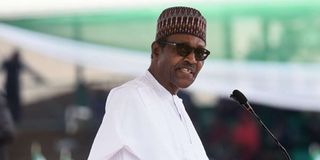Premium
Nigeria under Muhammadu Buhari: A timeline

Nigerian President Muhammadu Buhari.
A look back at key developments in Nigeria during the presidency of Muhammadu Buhari, currently the target of unprecedented protests in the West African giant.
2015: Early successes against Boko Haram
Buhari is elected president of Nigeria in 2015 on a pledge to defeat Boko Haram jihadists.
Two months after he is sworn in, he sacks the military top brass he inherited from his predecessor Goodluck Jonathan, and galvanises regional support against the jihadists.
A succession of announcements are made that hostages have been rescued and the rebels pushed back.
In November a new government is finally sworn in, more than five months after Buhari took office.
In December the president says Boko Haram is "technically defeated" and "no longer capable" of conventional attacks, though suicide bombers remain a threat.
2016: Recession
In May 2016 militants attack an oil installation belonging to US energy group Chevron in the first of a series of sabotage acts which will slash oil production by one million barrels a day over the year.
After negative growth in the first two quarters, the economy enters recession for the first time in 25 years, hit by attacks on oil facilities, a fall in crude prices, inflation and low foreign investment.
In August, the Islamic State group recognises a Boko Haram faction that broke away from long-time leader Abubakar Shekau in opposition to his indiscriminate targeting of civilians.
In October, after negotiations with the government, Boko Haram frees 21 of the 276 schoolgirls kidnapped from Chibok in Borno state in 2014, an incident that drew world attention.
2017: Mounting health concerns
In January 2017, 112 displaced people are killed when an air force jet accidentally bombs a camp in northeastern Nigeria instead of Boko Haram militants.
In May, 82 more Chibok schoolgirls are released.
Buhari spends more than 100 days in London for medical treatment for an undisclosed illness, returning home in August.
He had already spent nearly two months in London in January and February. Questions mount about his fitness to hold office.
In October the government agrees to compensation for victims of the 1967-70 civil war in southeastern Biafra, paying out over $150 million.
2018: Rise of IS-backed Boko Haram
In February, fighters from the self-styled Islamic State West Africa Province (ISWAP) faction of Boko Haram abduct 110 young girls from a school in Dapchi in Yobe state. A month later most are freed.
In June clashes between nomadic cattle herders and indigenous farming communities in central Nigeria leave more than 200 dead, the latest in a long-running battle for land and resources.
Calls are made for Buhari to restore order or resign.
In July Buhari's All Progressives Congress party suffers a wave of defections to the main opposition Peoples Democratic Party.
ISWAP steps up its deadly attacks on military bases.
2019: Disputed election
In February, Buhari is re-elected with 56 percent of the vote. The opposition cries foul. His main rival, Atiku Abubakar, challenges the results, which are validated in court in September.
Buhari unveils his new government in August.
2020: Coronavirus, protests
In March the capital Abuja and economic hub Lagos are locked down as part of measures to fight the coronavirus pandemic.
The lockdown is eased in May, while a curfew remains in place.
The authorities say oil revenues, on which Nigeria is dependent, have plummeted by 80 percent and the country will fall into recession.
In October, Nigeria is rocked by demonstrations against police violence which spiral into widespread calls for change.
The youth-led movement taps into the deep frustration of Nigerians over inequality in a major challenge to the ruling elite.
Amnesty International says at least 56 people are killed in the unrest, including peaceful protesters gunned down by security forces.





